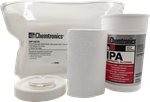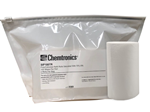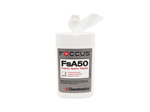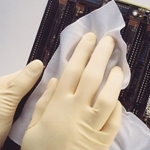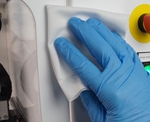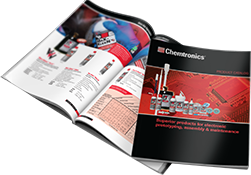Alcohol Wipes for Both Everyday Cleaning and Critical Applications
For many organizations, presaturated wipes are the ideal mix of form and function. Isopropyl alcohol (IPA) wipes are commonly used for degreasing, cleaning off fingerprints, removing flux residues, and even disinfecting hard surfaces.
Alcohol wipes generally come packaged in pop-up tubs where the wipes are pulled up from the top, plastic boxes, or pouches that reduce linting caused by wipe perforations. They can even come individually wrapped, which is perfect for field maintenance.
Isopropyl alcohol presaturated wipes can be used in a wide variety of applications:
- Cleaning optical surfaces
- Cleaning fiber optic connectors and fusion splicers
- Cleaning computer keyboards
- Cleaning and applying ESD treatments to display screens
- Removing oil, dust, and other contaminants
- Cleaning and protecting sensitive contact surfaces
What is Isopropyl Alcohol (IPA)?
Isopropyl alcohol (also referred to as CAS #67-63-0, IPA, isopropanol and 2-propanol) dissolves a wide range of polar and non-polar soils, including light oils, fingerprints, cutting fluids, flux residues, carbon deposits, and mold release.
For electronic printed circuit board (PCB) assembly, isopropyl alcohol is used to clean flux residues from recently soldered circuit boards and in both PCB repair and rework. IPA is also used to remove solder paste and adhesive from SMT stencils. Maintenance cleaning with isopropyl alcohol is common for removing caked-on and burnt-on flux from SMT reflow ovens, wave soldering fingers, selective soldering nozzles, pallets, and anywhere else flux tends to collect in automated soldering processes.
What Are the Common Concentrations of Isopropyl Alcohol (IPA)?
Isopropyl alcohol is available in a variety of dilutions. These dilutions are characterized by the amount of water in each solution. Isopropyl alcohol is hydrophilic or water miscible, so it readily accepts water into an azeotropic solution. When you see “70% isopropyl alcohol” on the label, it refers to the amount of alcohol in relation to the amount of dissolved water – i.e. 70% alcohol to 30% water. Water can be removed to form purer grades of isopropyl alcohol, forming what is called “anhydrous” isopropyl alcohol.
Whether IPA has 0.2% or 50% water has little effect on the look and smell of the material, but greatly impacts surface tension (its ability to wet), and its dry time. The more water isopropyl alcohol contains, the greater the surface tension. With a higher surface tension, you run the risk of the liquid beading up as it dries, which can lead to spotting. “Water spots” are particularly problematic when cleaning mirrors, lenses, and other optics.
The dry time is greatly increased as the percentage of water in the alcohol solution is increased. This can be an advantage or disadvantage depending on the application. For example, isopropyl alcohol is often used as a flux remover to remove flux residues from around solder joints. Technicians tend to prefer a fast dry time so they can clean the electronics and bring them back into service as quickly as possible.
For breaking down and removing thick, gummy, or baked-on materials where more dwell or soak time is required, slowing down the dry time often improves the cleaning effectiveness. This is one of the reasons that 70% pure isopropyl alcohol is commonly used for both degreasing and SMT stencil cleaning. In the case of electrical contact cleaning, the faster evaporation helps ensure that flammable solvent is gone before energizing the equipment.
Will Isopropyl Alcohol (IPA) Damage Sensitive Surfaces?
When a solvent is not compatible with a substrate, it may cause crazing (micro-cracks) or softening of the material. In the case of seals and gaskets, incompatibility may cause them to swell, shrink, or become brittle. Isopropyl alcohol is compatible with a wide range of materials including those commonly used in electronics. As with any chemical product used, component compatibility must be determined on a non-critical area prior to use.
Does Isopropyl Alcohol (IPA) Have Any Safety Issues?
Although isopropyl alcohol is generally considered safe if handled properly, it is a flammable solvent, so precautions need to be taken to prevent a dangerous situation. The central resource for all safety requirements is the SDS, which should be readily available wherever and whenever isopropyl alcohol is used.
The work area must be adequately ventilated to prevent an accumulation of vapors, which could combust. Ventilation should be explosion-proof. Because isopropyl alcohol is very flammable, it needs to be stored in a closed container in a cool, well-ventilated area away from ignition sources like heat, sparks, and flames.
Isopropyl alcohol has a tendency to defatten the skin, which means it draws out the protective oils from the skin and could lead to dermatitis. Gloves made of nitrile or other solvent-resistant materials can be worn to minimize this problem. Respirators can be used if ventilation is not adequate enough to avoid breathing in a high concentration of vapors, but that isn’t usually an issue with presaturated wipes, since the amount of IPA is minimal.
Can Isopropyl Alcohol (IPA) Wipes Prevent the Spread of COVID-19 (Coronavirus)?
The first step for preventing the spread of COVID-19 is cleaning surfaces, which physically removes viruses and other contaminants. This is similar to washing your hands with soap and water, and is very effective when followed by a disinfecting process. Alcohol-based presaturated wipes are effective and efficient for hard surface cleaning, and should be considered a critical part of any effective workspace hygiene regimen.
The second step is disinfecting. A disinfecting agent actually kills a virus. Alcohols are no longer specifically recommended by the CDC for disinfecting hard surfaces from SARS-CoV-2 (the virus that causes COVID-19). Again, these products are only for use on surfaces, not humans.
Can Isopropyl Alcohol (IPA) Wipes Be Used for Other Types Disinfecting?
IPA has been shown to be effective on lipid viruses per studies reported by the CDC. Antimicrobial effectiveness drops when diluted below 50% concentration. The optimum concentration is 60-90% solutions in water, because water may denature microbial proteins and increase contact time by extending evaporation.
Can Isopropyl Alcohol (IPA) Wipes Be Used for Sterilization?
Alcohols have been shown to be effective as bactericides, fungicides, and virucides. However, they cannot be considered for sterilization because they do not kill bacterial spores.

